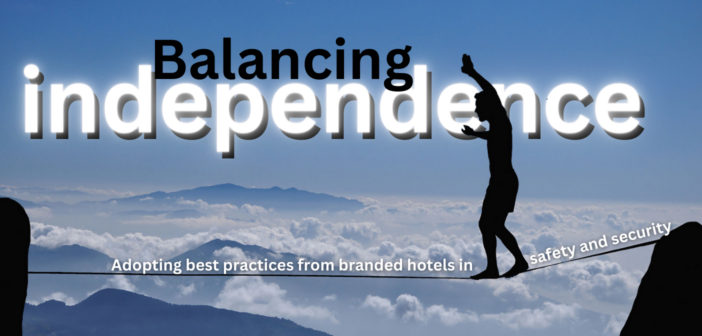Adopting best practices from branded hotels in safety and security
While independent hoteliers cherish their autonomy in crafting unique guest experiences, there’s value in borrowing a page from branded hotels when it comes to safety and security practices. Branded hotels, with their greater liability exposure, often deploy specialized teams to assess and mitigate risks. In this column, we explore seven ways independents can enhance their safety and security measures by drawing inspiration from branded hotel practices, integrating technology, staff training, and community engagement.
1. Risk mitigation teams and technology: Independent operators should consider establishing specialized teams dedicated to assessing and mitigating risks. This could involve adopting technological solutions such as surveillance systems, access controls, and even exploring the potential of robotic assistance in monitoring and securing the property. Embracing technology allows independents to enhance security without compromising the personalized touch that distinguishes independent hotels.
2. Training front desk staff for deescalation: To address potential conflicts, independent properties can invest in training programs for front desk staff focused on de-escalation techniques. Empowering staff to handle tense situations calmly and professionally contributes to a safer environment for both guests and employees.
3. Comprehensive guest agreements: Following the example of branded hotels, independent operators can implement comprehensive guest agreements that include terms and conditions along with the registration card. This ensures guests are fully aware of the rules and expectations during their stay, reducing the likelihood of disputes and conflicts.
4. Vigilance against illicit activities: Independent hoteliers can learn from branded hotels in identifying and preventing illegal activities on their premises. Implementing training programs to recognize signs of prostitution, human trafficking, or drug-related activities is crucial. Creating a “do not rent” list for individuals involved in such activities, along with their associates, helps mitigate risks and ensures a safer environment for all guests.
5. Collaboration with local law enforcement: Establishing strong relationships with local law enforcement is a practice independents can adopt from their branded counterparts. Regular communication with the police department fosters a cooperative approach to security, allowing for a more effective response in case of emergencies and enhancing overall safety.
6. Safety measures for housekeeping: Equipping housekeeping staff with safety devices such as pepper spray adds an extra layer of protection. This proactive measure empowers staff to respond to potentially dangerous situations and enhances their confidence in ensuring the safety of the property.
7. Guest identification and room monitoring: Adopting the practice of always verifying guest identification and monitoring the number of people in each room contributes to security. This ensures the property maintains control over its occupancy and can respond promptly to any unauthorized individuals on the premises.
While independence remains a hallmark of operations in this segment of the market, there’s wisdom in incorporating best practices from branded hotels to elevate safety and security measures. By blending technology, staff training, and community engagement, independent hoteliers can strike a balance, providing a unique and secure experience for their guests. Embracing these practices not only enhances the safety of the property but also positions independent operators as leaders in the evolving landscape of hospitality security.





